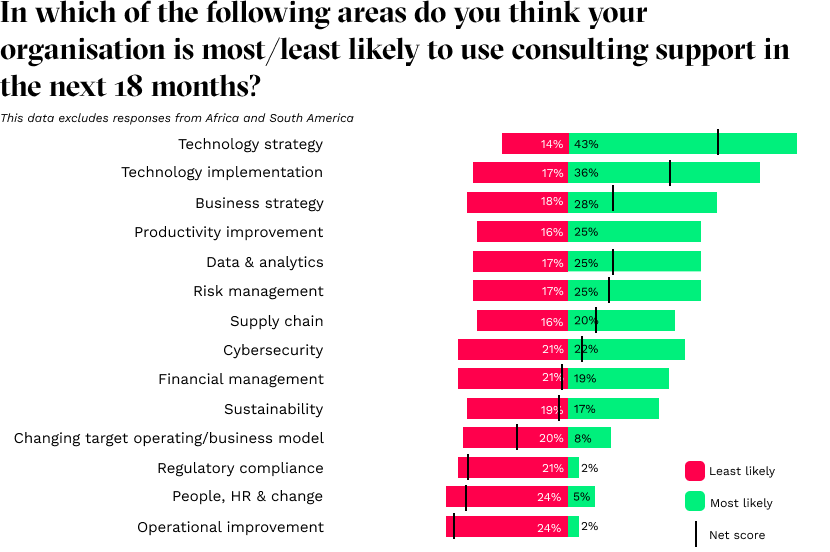Sustainability services: A challenging market, but one that’s here to stay
Clients we’ve recently surveyed tell us that their willingness to invest in sustainability and other ESG-related areas is almost as strong as ever. But do they really mean it?
In the current economic environment, it’s reasonable to assume that clients might renege on their often ambitious investment plans around environmental, social, and governance (ESG) issues. But our client data, gathered throughout the first half of this year, suggests that’s not the case. Just under half (47%) of client organisations say they expect to make a significant investment in ESG in the next 18 months, and a further 36% over the next three years.
In the short term, only digital transformation sits higher on the investment agenda, and this—in contrast to investment in ESG—seems likely to wane over the next three years, as organisations seek to get a return on their technology expenditure since 2020 (around one in nine organisations say they spent more on technology in the last year compared to the previous year, and an even higher proportion expect to spend the same or more in the next 18 months).
However, if we look at the extent to which overall expenditure in both ESG and digital transformation translates into demand for professional services over the next 18 months, the picture is very different.
Asked where they’re most and least likely to spend on outside help, 43% of clients name technology strategy as the most likely target for their consulting budgets, and 36% say the same of technology implementation. By contrast, 14% and 17%, respectively, say that these are areas where they’re least likely to use consultants, giving net positive scores in favour of external support of 29% and 19%. We need to be careful here. Saying that an area is the least likely to receive investment on third party support doesn’t mean clients aren’t spending there at all: It simply means that the money they are investing is going to in-house teams.
That nicety matters when we look at sustainability services. Here, the balance between those clients saying they’re most or least likely to spend on consulting and other professional services—effectively, most likely to use external help and most likely to use internal support—is very different. Just 8% of clients say sustainability services are the area in which they’re most likely to bring in external help, and 19% say the opposite.

This backs up what we’re hearing in our interviews with clients. The desire to invest in sustainability remains as strong as it was post-pandemic, but the reality is that expenditure on external services is being squeezed by a combination of factors: the assumption that organisations will need sustainability-related skills in the long term, meaning that it makes economic sense to build up in-house teams; uncertainty around what action to take in practice; and the desire to build sustainability work into existing projects (and budgets), rather than commissioning entirely new work.
Countering these pressures will, we think, require professional services firms to do three things:
- Firstly, they need to demonstrate that the depth of their expertise in the sustainability space is deeper than most clients have or could build. It would also help to have data that shows just how scarce these skills are, especially in the emerging or more esoteric areas of sustainability, as clients tend to be wildly optimistic where recruitment is concerned.
- Secondly, given that clients are struggling to develop meaningful responses to many of their sustainability challenges, professional services firms should provide clients with clear evidence of the impact that they can have—clients need confidence to move forwards.
- Finally, as our latest research into the sustainability services market shows, to win work in this increasingly busy, undifferentiated market, innovation, technology solutions, and good account management (bringing a multidisciplinary approach, for example) will be crucial.